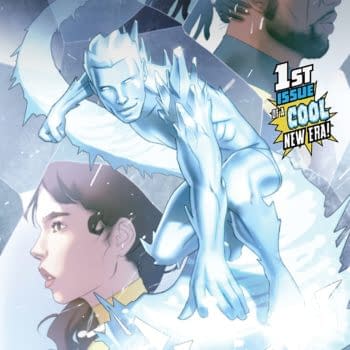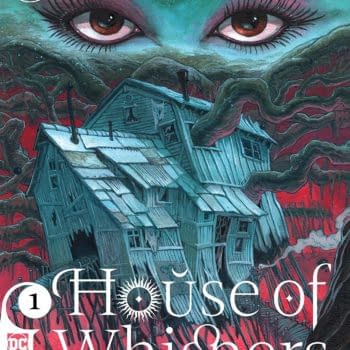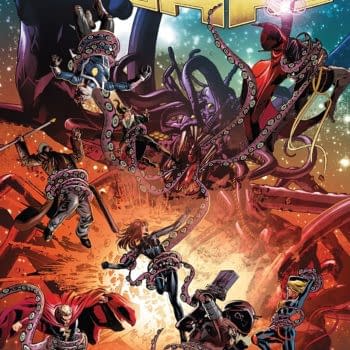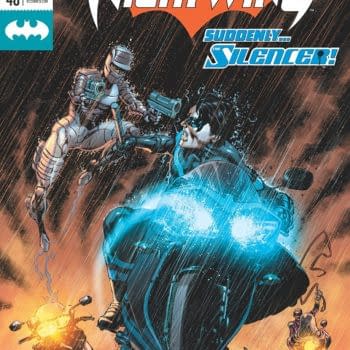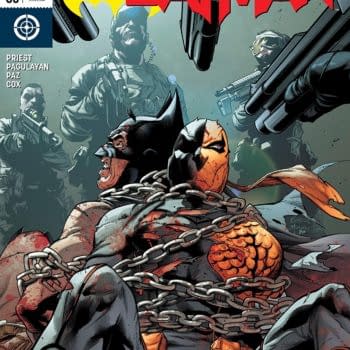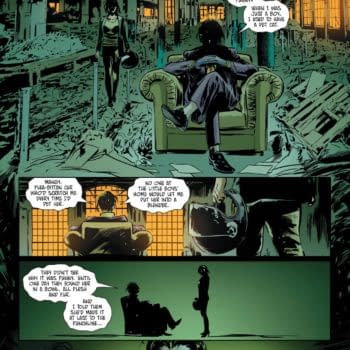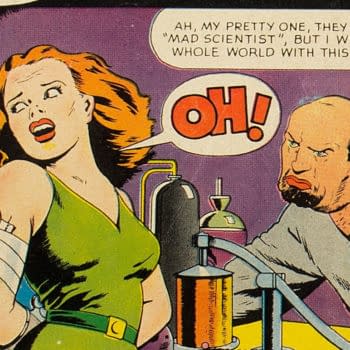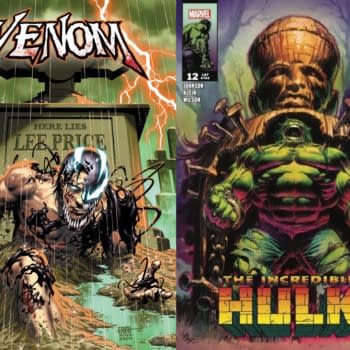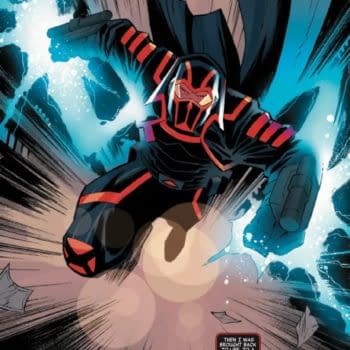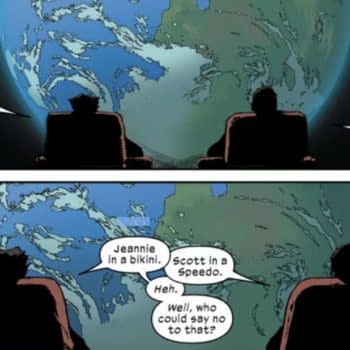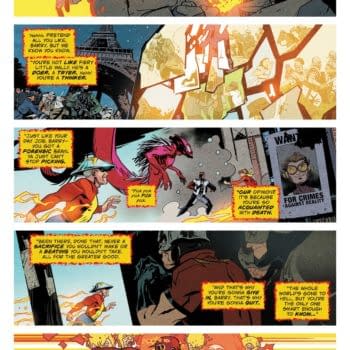Posted in: Comics, Rebellion / 2000AD | Tagged: 2000 ad, 2000 ad/rebellion, alan davis, Alan Moore, Ben Smith, dc thomson, graeme mcmillan, ipc/fleetway, judge dredd, Michael Molcher, misty, rebellion, rosie knight, zack davisson
Treasury of British Comics: Can a Forgotten Archive Teach Us About Comics in the 21st Century? [SDCC]
Photo and Words by Bleeding Cool's Mike Sangregorio:
Once upon a time the publishers of IPC/Fleetway and DC Thomson were the Big Two of British comics. 2000 AD, publisher of Judge Dredd among other works, has purchased the majority of the archive of IPC/Fleetway and has been steadily trying to reprint them for public consumption. The panel was moderated by Michael Molcher, freelance writer for 2000 AD, and featured Graeme McMillan, writer for the Hollywood Reporter, Ben Smith, head of books and comics at Rebellion (2000 AD's parent company), Zack Davisson, manga translator, and Rosie Knight, columnist.
Comics are a medium, superheroes are a genre. That genre is now in TV and film in a way it has never been before. Why do comics, mainstream American ones in particular, focus so heavily on one one genre? It was not always that way and certainly not in Britain during the 1970s.
Since the year 2000 Rebellion has been the publisher of 2000 AD. At that time the title was the last of what had once been a wide variety of comics offered to the public. After working to get 2000 AD back to its number one position on the newsstand, Ben looked into acquiring the IPC archive. This was after a conversation with Pat Mills, celebrated Judge Dredd editor, on a flight to San Diego. Pat reminisced about Misty, a supernatural 'Girls Comic' from back in the day.
The panel was quick to point out that the terms Girls Comic and Boys Comic were standard parlance. This is how they were marketed and referred to by both creator and fan, but they were not limited to any specific genre the way other nations might interpret those phrases. Each of the comics were anthologies with a variety of features in each, some of which were only a single page, or a few.
The archive consists of about 600,000 pages of British comics. The majority of which has not been seen since they were released in their original weekly format. For a long time, if you were a British creator, you probably knew more about the history of American comics than British comics. Their strength were in part due to their variety. Genres as varied as nature, war, Beatles biography, and even "an entire series about foxes" were represented in their pages.
The first, and most daunting task, was working on the comics' family trees. Each title would begin with unique stories each of which could be folded into other titles, or have features folded into it from others, as popularity waned on any particular title. The result is "an incredibly incestuous family history to these titles." Hundreds and hundreds of titles each with their own unique lineage.
The aforementioned Misty was a favorite of the panel. Knight remarked that "this helps prove that women have always been a market for comics" and that "you need to prove this because it then allows for publishers to understand that more than one type of person read comics." Ben added that Girls Comics outsold Boys Comics by far. This distinction is something that the Japanese are very open about and for the most part the former outsells the latter, by far.
Graeme recalls reading Misty, not even considering a Girls Comic as something that he would not read. This began a discussion about a specific aspect of Girls Comics, they were often about a class struggle that the characters were caught in. Michael noted that "in America you don't have class, you have race, but the parallels are the same."
On the subject of class, these comics were not marketed toward the wealthy and were "made affordable at 5 or 6 pence." These were comics for poor people. Knight discussed how Jack Kirby did this with Ben Grimm but that it was never as overt and explicit.
This drove a discussion of the fact that "you can't have an apolitical comic. You can't do a non-political Judge Dredd comic." Davisson commented that he believed the fans who are demanding that politics be taken out of comics are all fans of comics which were not focused on that, he specifically mentions those of the early 1990s, but that comics are now returning to their roots and that modern comics are more honest in this regard.
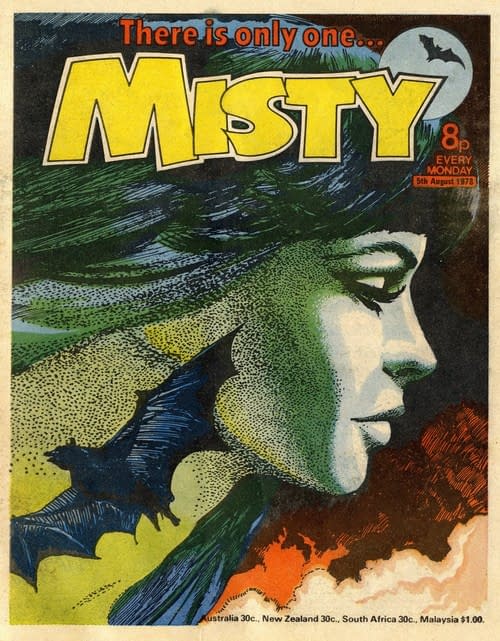
Alan Moore's favorite comic is apparently the IPC strip known as Face Ache. This Jack Cole-esque character was a student who could contort his body (though first it was just his face, hence the name) into weird, outsized shapes. These absurdist strips were mainly the work of Ken Reid and their impact, the panel felt, could still be seen in Kevin O'Neill's work on the League of Extraordinary Gentlemen and DR & Quinch by Alan Moore and Alan Davis. These comics popularized the nine panel grid that everyone from Watchmen to Tom King's Mister Miracle make use of. There were no splash pages as "that was seen as a waste of real estate."
Each title, and subtitle, had everything a reader needed to know about the comic. Graeme remarked that they offered "not just the economy of storytelling but proof that every sort of reader and every sort of character deserves a story." There were football strips and comics for all walks of life as "comics were ubiquitous back then."
These were the strips that were created in a time when comics were still remembered as dangerous and that they rotted your brain.
Michael closed the panel by saying that he would love to see a return to a specific type of fan involvement that included rivalries, whose fires are stoked by the creators, and fan clubs complete with membership cards.
Several collected editions are currently available from 2000 AD with more to follow in the future.


![Treasury of British Comics: Can a Forgotten Archive Teach Us About Comics in the 21st Century? [SDCC]](https://mlpnk72yciwc.i.optimole.com/cqhiHLc.IIZS~2ef73/w:600/h:450/q:75/https://bleedingcool.com/wp-content/uploads/2018/07/IMG_1877.jpg)
